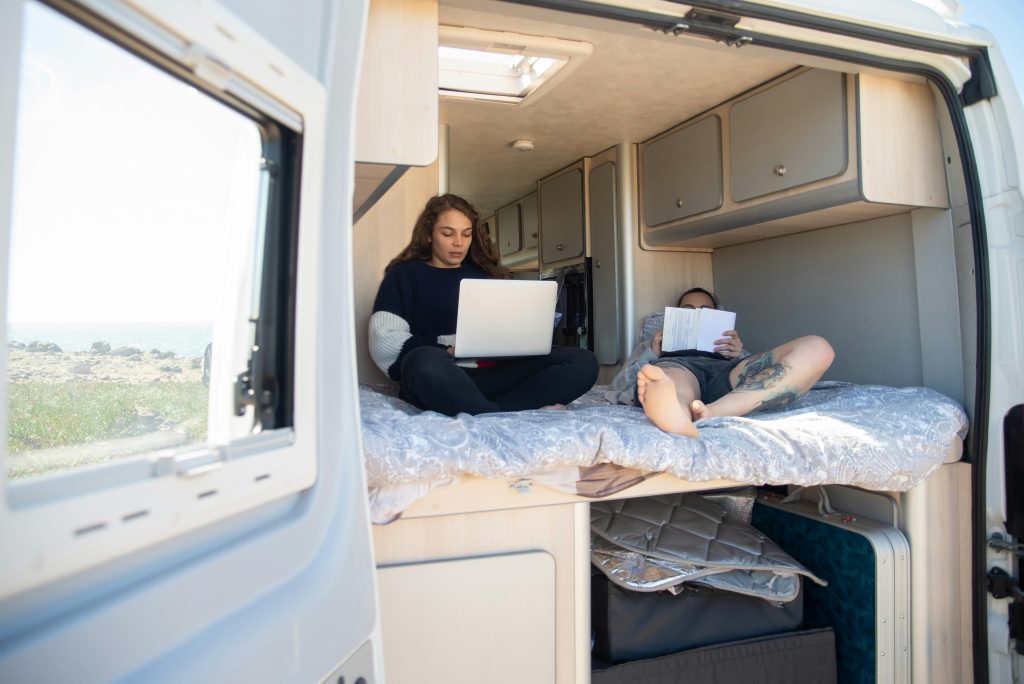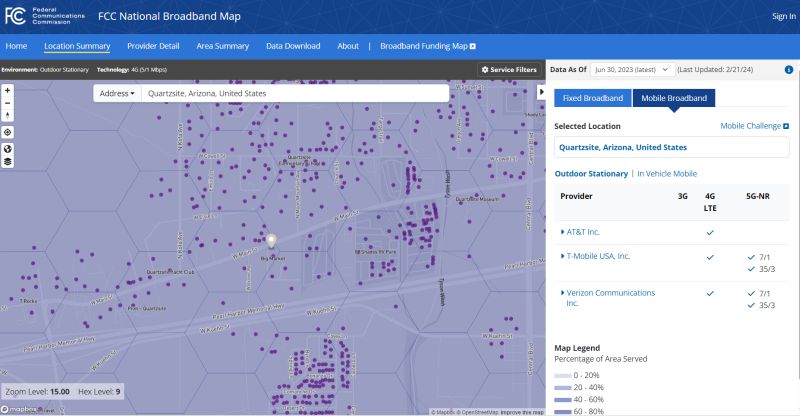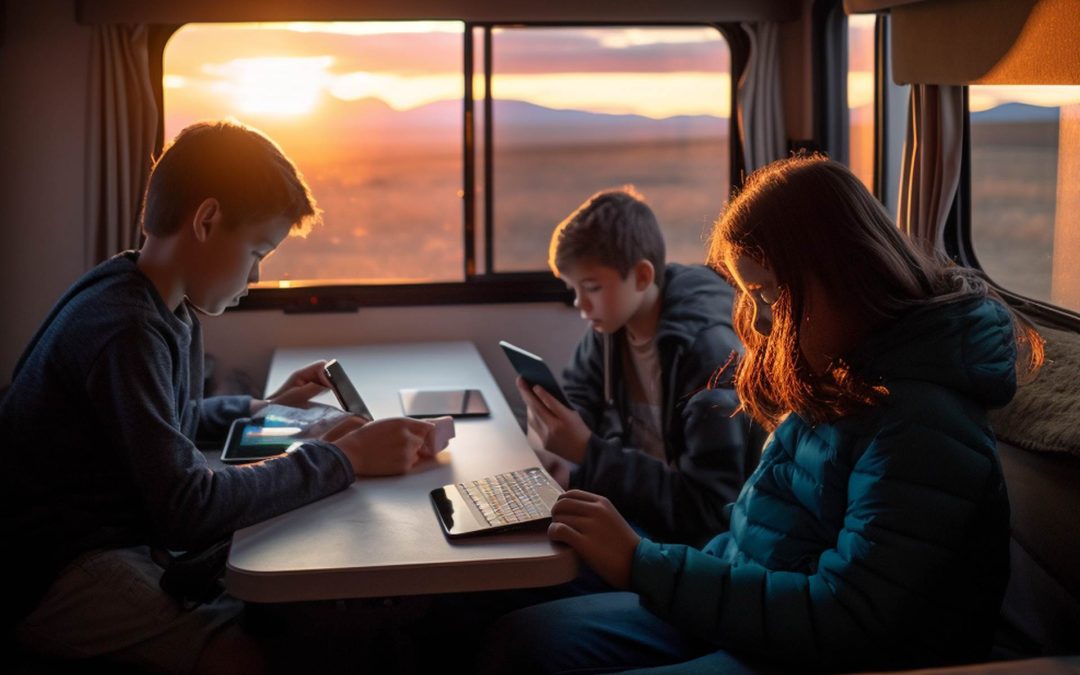Your Guide to RV Internet Solutions
The open road beckons, promising adventure, freedom, and a chance to explore the beauty of the country. But for many RVers, staying connected to the internet is no longer a luxury, it’s a necessity. Whether you’re a remote worker, a social media enthusiast, or simply enjoy staying in touch with loved ones, having reliable internet access on the road is crucial.
But with so many options available, finding the “best” internet solution for your RV can be overwhelming. From satellite internet to mobile hotspots and Wi-Fi boosters, each option has its own pros and cons, making it difficult to know where to start.
This comprehensive guide will equip you with the knowledge and resources you need to navigate the world of RV internet. We’ll explore different solutions, answer frequently asked questions like “what is the best mobile internet for RV” and “how much is satellite internet for RV”, and help you choose the perfect setup to stay connected no matter where your travels take you.
So, buckle up and get ready to discover the freedom of the open road, without sacrificing your online connection!

Understanding Your RV Internet Needs
Before diving into the world of RV internet solutions, it’s crucial to understand your individual needs. Just like navigating the open road requires a map, understanding your internet usage will guide you towards the perfect solution for your RV adventures.
Think about how you plan to use the internet while on the road:
- Work from anywhere: Remote workers and digital nomads require reliable and consistent internet for video conferencing, file sharing, and using cloud-based applications. This typically translates to needing a higher data plan and prioritizing stable connections.
- Stay connected and entertained: Social media enthusiasts, casual web browsers, and those who enjoy streaming movies or music occasionally can opt for more moderate data plans. Downloading large files or frequent high-definition streaming might require a more robust solution, however.
- Basic online needs: If you primarily use the internet for checking emails, browsing the web, or staying connected with loved ones on social media, a limited data plan or even relying on occasional public Wi-Fi (with caution) might suffice.
Understanding data requirements:
Each online activity consumes data at varying rates. Streaming an HD movie can devour significantly more data compared to checking emails. Familiarize yourself with the data requirements of your most frequent online activities to estimate your overall usage.
Beyond just staying connected:
Reliable internet access can truly enhance your RVing experience in several ways:
- Stay connected with loved ones: Share your adventures and experiences with family and friends through video calls or social media.
- Work remotely: Embrace the freedom of location independence and manage your workload from the comfort of your RV.
- Access entertainment: Stream movies, listen to music, or catch up on your favorite shows while enjoying downtime.
- Plan your trip: Research campsites, explore local attractions, and navigate unfamiliar roads with ease.
By understanding your specific needs and data requirements, you’ll be well-equipped to choose the most appropriate RV internet solution for your adventures.
 Click Here to visit the FCC National broadband Map
Click Here to visit the FCC National broadband Map
Exploring RV Internet Solutions
Now that you understand your RV internet needs, let’s delve into the various options available to keep you connected on the road. Each solution comes with its own set of advantages and limitations, so choosing the right one depends on your individual needs and travel plans.
- Satellite Internet:
- Pros: Offers the widest coverage, even in remote locations, making it ideal for those who frequently venture off the beaten path.
- Cons: Often comes with the highest cost compared to other options, can experience higher latency (delay) impacting real-time applications like video conferencing, and data plans can be limited.
- Key providers: Viasat, HughesNet
- Cellular Data Plans:
- Pros: Generally more affordable than satellite internet, offers good speeds in areas with strong cellular coverage, and various providers offer flexible data plans to suit different usage needs.
- Cons: Coverage can be limited, especially in rural areas, data usage can be capped and subject to throttling (slowed speeds) after exceeding the limit, and signal strength can vary depending on location.
- Understanding coverage maps: It’s crucial to check the FCC coverage map of different cellular providers to ensure you’ll have a signal in the areas you plan to visit.
- Public Wi-Fi:
- Pros: Often readily available in campgrounds, rest areas, and some towns, offering a free or low-cost option for occasional internet access.
- Cons: Speeds can be unreliable and congested, security risks are high as public Wi-Fi networks are often unencrypted, making them vulnerable to data breaches and hacking.
- Safe usage tips: If using public Wi-Fi, avoid accessing sensitive information like bank accounts or using online payment methods. Consider using a VPN (Virtual Private Network) to encrypt your internet traffic and add an extra layer of security.
Choosing the Best Option:
The best RV internet solution for you depends on several factors:
- Your budget: Satellite internet is generally the most expensive option, while public Wi-Fi can be free but comes with limitations. Cellular data plans offer a range of options at varying price points.
- Your travel plans: If you frequent remote areas, satellite internet might be necessary. If you mostly stay in campgrounds with Wi-Fi or have good cellular coverage in your travel destinations, other options might be sufficient.
- Your internet usage needs: High data users like remote workers might require a plan with a large data allowance, while casual internet users might be able to get by with a more limited plan.
Comparison Table:
| Feature | Satellite Internet | Cellular Data Plans | Public Wi-Fi |
|---|---|---|---|
| Coverage | Widest | Varies depending on provider | May be available in campgrounds, rest areas, and towns |
| Cost | Highest | Varies depending on provider and data plan | Free or low-cost |
| Speed | Moderate | Good in areas with strong signal | Varies, often unreliable and congested |
| Data Limitations | Can be limited | Can be capped and throttled | None |
| Security | Generally secure | Vulnerable on unencrypted networks | Highly vulnerable |
By carefully considering your needs and evaluating the different options, you can choose the RV internet solution that keeps you connected and allows you to fully enjoy your nomadic adventures.

Mobile Hotspots
Hitting the road doesn’t have to mean sacrificing your internet connection. Mobile hotspots offer a convenient and portable solution for staying connected on your RV travels. But what exactly are they, and how can they benefit you?
A mobile hotspot is a small device that creates a Wi-Fi network using a cellular data connection. Think of it as a portable cell phone tower that can share its internet connection with multiple devices, like laptops, tablets, and smartphones.
Benefits for RVers:
- Convenience: Mobile hotspots are compact and easy to carry, making them ideal for on-the-go connectivity.
- Flexibility: You can choose from various data plans offered by different carriers, allowing you to find one that fits your budget and usage needs.
- Multiple device connectivity: Share your internet connection with all your Wi-Fi enabled devices, ensuring everyone in your RV stays connected.
Popular Mobile Hotspot Devices:
| Device | Features | Compatibility |
|---|---|---|
| Netgear Nighthawk M6 Pro | Powerful 5G & 4G LTE connectivity, long battery life, touchscreen display | Multiple carriers |
| Inseego MiFi M2000 | Affordable 5G & 4G LTE option, supports up to 32 devices | Verizon, AT&T, T-Mobile |
| Alcatel LINKZONE MW460 | Budget-friendly 4G LTE hotspot, good for basic internet needs | Multiple carriers |
Choosing the Right Data Plan:
Comparing data plans from different carriers is crucial for finding the best fit for your RV travels. Here are some key factors to consider:
- Coverage: Ensure the carrier you choose offers good coverage in the areas you plan to visit. Check their coverage maps online or consult with their customer service representatives.
- Data allowance: Choose a data plan with an allowance that meets your needs. Consider your typical data usage and factor in potential spikes from streaming or downloading large files.
- Cost efficiency: Compare prices and data allowances offered by different carriers to find the most cost-effective option for your budget.
Maximizing Hotspot Performance:
- Positioning: Place your mobile hotspot in a location with a strong cellular signal for optimal performance. Avoid keeping it in metal containers or enclosed spaces that can weaken the signal.
- Optimize device settings: Disable unnecessary background applications and features that consume data on your connected devices.
- Data conservation practices: Utilize data-saving features on your devices, such as lower video streaming quality and avoiding automatic downloads.
By understanding the benefits of mobile hotspots, comparing device features and data plans, and following these tips for maximizing performance, you can leverage this convenient solution to stay connected on your RV adventures.
Wi-Fi Boosters and Extenders
 While mobile hotspots and other solutions offer great connectivity on the road, sometimes you might encounter situations with weak Wi-Fi signals, especially in campgrounds or rest areas. This is where Wi-Fi boosters and extenders come in handy.
While mobile hotspots and other solutions offer great connectivity on the road, sometimes you might encounter situations with weak Wi-Fi signals, especially in campgrounds or rest areas. This is where Wi-Fi boosters and extenders come in handy.
How do they work?
Imagine a Wi-Fi signal as a radio broadcast. Boosters and extenders act like signal amplifiers, capturing the existing Wi-Fi signal, amplifying it, and rebroadcasting it to create a stronger and wider coverage area for your devices.
Benefits for RVers:
- Improved Wi-Fi reception: Extend the reach of existing Wi-Fi networks, allowing you to connect from further distances within the campground or rest area.
- Enhanced connection strength: Strengthen weak Wi-Fi signals, improving overall internet browsing, streaming, and download speeds.
- Cost-effective solution: Compared to purchasing additional data plans for your mobile hotspot, boosters can be a more economical option for occasional signal strength improvements.
Top Wi-Fi Boosters for RV Use:
| Device | Features | Pros | Cons |
|---|---|---|---|
| Alfa Camp Pro 2 Kit | Powerful directional antenna, long-range reception, weatherproof design | Excellent range, ideal for remote locations | Requires setup and configuration, bulkier design |
| WeBoost Dome | Sleek, compact design, easy setup, supports multiple devices | User-friendly, good for basic signal boosting | Shorter range compared to directional antennas |
| TP-Link RE220 AC750 | Budget-friendly option, easy to use, multiple connectivity options | Affordable, good for small RVs | Lower range compared to high-powered options |
Choosing the Right Wi-Fi Booster:
Consider these factors when selecting a Wi-Fi booster for your RV:
- Range: Choose a booster with a range that covers the entire area of your RV and potentially even outside.
- Portability: If you move locations frequently, consider a compact and lightweight design.
- Ease of use: Opt for user-friendly options with clear instructions, especially if you’re not tech-savvy.
Installation Tips:
- Location: Place the booster in a central location within your RV with minimal obstructions between the booster and the Wi-Fi source.
- Antenna setup: If your booster has external antennas, adjust them for optimal signal reception. Refer to the manufacturer’s instructions for proper positioning.
Real-World User Experiences:
Many RVers swear by the convenience of Wi-Fi boosters. Here are some user recommendations:
- “The Alfa Camp Pro 2 Kit was a lifesaver on our remote camping trip. We could finally enjoy some reliable internet access in the evenings.” – John S., avid RVer
- “The TP-Link RE220 is a great budget-friendly option for occasional signal boosting in campgrounds with Wi-Fi.” – Sarah M., RV blogger
By understanding how Wi-Fi boosters work, choosing the right one for your needs, and following installation tips, you can leverage these devices to improve your internet connectivity and enhance your RVing experience.
 Botnet Sky, CC BY-SA 4.0, via Wikimedia Commons
Botnet Sky, CC BY-SA 4.0, via Wikimedia Commons
The Evolving Landscape of RV Internet
The world of RV internet connectivity is constantly evolving, with exciting new technologies emerging on the horizon. Staying informed about these advancements can help you plan for the future and potentially unlock even better internet access on your travels.
5G and Beyond:
The rollout of 5G technology promises significantly faster and more reliable internet speeds compared to traditional 4G LTE networks. This has the potential to revolutionize RV internet access, offering:
- Improved streaming and downloading: Enjoy uninterrupted streaming of movies and music, and experience faster download times for large files.
- Enhanced video conferencing: Participate in clearer and smoother video calls for remote work or staying connected with loved ones.
- Reduced latency: Experience faster response times for online activities, making real-time applications like gaming more enjoyable.
While 5G coverage is still expanding, it holds immense potential for future RV travel connectivity.
Emerging Solutions:
Beyond 5G, several other innovative solutions are making waves in the RV internet scene:
- Mesh networks: These systems use multiple interconnected devices to create a blanket of Wi-Fi coverage throughout your RV, eliminating dead zones and ensuring a strong connection across all devices.
- Starlink: This satellite internet service from SpaceX aims to provide high-speed internet access globally, including remote areas, potentially offering a reliable option for RVers venturing off the beaten path.
It’s important to note that these emerging solutions are still evolving, and their accessibility, affordability, and limitations are subject to change. However, they represent exciting possibilities for the future of RV internet connectivity.
Staying informed:
Keeping an eye on industry developments and researching these emerging technologies can help you make informed decisions about your RV internet setup in the future. As these solutions become more readily available and affordable, they might offer even more robust options for staying connected on the road.

Security Matters
While exploring new landscapes and embracing the freedom of RVing, securing your digital space is crucial. Internet security becomes especially important when using public Wi-Fi networks, often readily available in campgrounds, rest areas, and some towns.
Why is security essential?
Public Wi-Fi networks are often unencrypted, making them vulnerable to hacking and data breaches. Hackers can potentially steal your personal information, login credentials, or even financial data if you’re not careful.
Protecting yourself on the road:
Here are some key practices to safeguard your data and devices while using the internet on your RV travels:
- Strong passwords: Use unique and complex passwords for all your online accounts and change them regularly. Consider using a password manager to help you create and manage strong passwords.
- Encryption: Enable encryption on your devices whenever possible. This scrambles your data, making it unreadable even if intercepted by hackers.
- Firewalls: Ensure your devices have firewalls enabled to act as a barrier against unauthorized access attempts.
The power of a VPN:
For an extra layer of security, especially when using public Wi-Fi, consider using a VPN (Virtual Private Network). A VPN encrypts all your internet traffic, creating a secure tunnel between your device and the internet, effectively cloaking your online activity from prying eyes.
Choosing a VPN for RVers:
When selecting a VPN for your RV travels, look for these features:
- Strong encryption: Opt for a VPN that uses industry-standard encryption protocols like AES-256.
- Fast speeds: Choose a VPN with efficient servers that offer good speeds to avoid significant slowdowns while browsing or streaming.
- Multiple server locations: Look for a VPN with servers in various locations, allowing you to connect to the most convenient server for your current location.
- Mobile device compatibility: Ensure the VPN service is compatible with your smartphones, tablets, and laptops used on your RV adventures.
By following these security practices and utilizing a reliable VPN, you can significantly reduce the risks associated with using public Wi-Fi networks and ensure your online activities remain secure while on the road.

Budgeting for Internet on the Road
Staying connected on the road shouldn’t come at the expense of your travel budget. Understanding the costs associated with different RV internet solutions and employing smart budgeting strategies can help you find a balance between connectivity and affordability.
Cost Breakdown:
Here’s a simplified overview of the costs associated with various RV internet solutions:
| Solution | Typical Cost Range |
|---|---|
| Satellite Internet | $50-$200 per month (including equipment cost) |
| Cellular Data Plans | $20-$100 per month (depending on data allowance) |
| Public Wi-Fi | Free (but consider potential security risks) |
| Mobile Hotspot Devices | $50-$200 (one-time cost) |
Budgeting Strategies:
- Evaluate your needs: Analyze your internet usage patterns and determine the level of connectivity you truly require. Do you need high speeds for work or streaming, or is occasional browsing sufficient?
- Compare data plans: Research data plans offered by different cellular carriers, focusing on coverage in your intended travel destinations and data allowances that align with your needs.
- Consider alternatives: Explore free Wi-Fi options in campgrounds or libraries, but prioritize security by using a VPN whenever connecting to public networks.
- Utilize offline resources: Download movies, books, and music beforehand to access them offline, especially during long stretches without internet access.
- Monitor data usage: Keep track of your data consumption to avoid exceeding plan limits and incurring overage charges.
Remember: The most expensive option isn’t always the best. By carefully evaluating your needs, employing these budgeting strategies, and exploring alternative options, you can find an RV internet solution that fits your budget and keeps you connected without breaking the bank.
Real-Life Success Stories
The open road beckons, but staying connected while RVing can be a challenge. Fear not, fellow adventurers! We’ve gathered real-life stories and practical tips from seasoned RVers on using various internet solutions to conquer connectivity hurdles. For more insights, visit RV Mobile WiFi or Satellite discussions on iRV2 Forums.
Meet the Mobile Mavericks:
-
The Millers: John and Sarah Miller, a retired couple full-timing across the country, rely on a combination of cellular data and park Wi-Fi. They use a mobile hotspot with a T-Mobile unlimited data plan for on-the-go connectivity, supplemented by park Wi-Fi when available. Their pro tip: “Prioritize data usage – video calls and streaming eat up data quickly. We download movies and shows beforehand for offline viewing.”
-
The Solo Adventurer: Kate, a freelance writer traveling solo, swears by satellite internet. “It keeps me connected and productive in the most remote locations,” she says. “While pricier, it’s worth it for the peace of mind and the ability to meet deadlines.” Her valuable lesson: “Research satellite internet providers thoroughly, considering data allowances and potential weather-related limitations.”
-
The Workaholic Wanderers: Mike and Emily, a remote-working duo, utilize a cellular data plan with a signal booster. “The booster significantly improves reception in remote areas,” Mike shares. “We also carry a portable Wi-Fi router to extend the signal for multiple devices.” Their practical tip: “Invest in a good quality signal booster and a reliable data plan with sufficient data allowance to avoid overage charges.”
Beyond the Stories:
These are just a few examples, and the “best” solution depends on individual needs and travel style. Consider these factors:
- Travel patterns: Frequent remote locations might favor satellite internet, while park hopping might benefit from a combination of cellular data and park Wi-Fi.
- Data usage: If you stream regularly, prioritize unlimited data plans or park Wi-Fi access.
- Budget: Cellular data can be cost-effective, while satellite internet comes at a premium.
Remember:
- Research: Compare plans and providers based on your needs and coverage areas.
- Be flexible: Adapt your approach based on location and available options.
- Prioritize: Manage data usage wisely, prioritizing essential tasks.
With the right approach and these valuable insights from fellow RVers, you can stay connected on the road and make your RVing adventures truly fulfilling!
Embracing the Connected RVing Life
Staying connected while exploring the open road is no longer a dream. As these real-life stories demonstrate, various internet solutions empower RVers like you to stay productive, connected, and informed, regardless of their travel style or location.
Remember:
- There’s no “one size fits all” solution. Consider your individual needs, data usage patterns, and budget when choosing your internet setup.
- Research thoroughly. Compare providers, plans, and coverage areas to find the best fit for your adventures.
- Embrace adaptability. Be prepared to adjust your approach based on location and available options.
Ready to join the thriving community of digital nomad RVers? With the right tools and resources, you can work, connect, and explore like never before.
Share your story! We invite you to comment below and share your experiences with RV internet solutions. What challenges have you faced? What solutions have worked best for you?
Help us improve! To better understand your needs and preferences, we encourage you to complete our short feedback survey (link to survey).
Let’s connect! Follow us on social media (links to social media platforms) for ongoing discussions, tips, and inspiration for your connected RVing journey.
Together, let’s conquer the roadblocks to connectivity and embrace the possibilities of the digital nomad RVing lifestyle!
Appendices
Appendix A: Glossary of RV Internet Terms
- Cellular data: Internet access provided by mobile phone network towers.
- Mobile hotspot: A device that converts your cellular data signal into a Wi-Fi network for multiple devices.
- Satellite internet: Internet access delivered via satellites orbiting Earth.
- Park Wi-Fi: Wi-Fi network offered by campgrounds or RV parks.
- Data usage: The amount of data transferred over your internet connection.
- Unlimited data plan: A cellular data plan offering a specific amount of high-speed data before potential throttling.
- Signal booster: An amplifier that strengthens cellular signal strength.
- Data allowance: The amount of data included in a satellite internet plan.
- Throttling: When a provider slows down your internet speed after exceeding a certain data usage limit.
Appendix B: Resources for RV Internet
Internet Service Providers (ISPs):
- Major cellular network providers (AT&T, Verizon, T-Mobile)
- Satellite internet providers (Starlink, Viasat)
Tools:
- Mobile hotspot devices
- Signal boosters
- Portable Wi-Fi routers
Further Reading:
- RV Mobile Internet Resource Center (https://www.rvmobileinternet.com/): Operated by Chris Dunphy & Cherie Ve Ard, who are full-time RVers themselves, this site is a goldmine of information for anyone looking to stay connected while on the road. They offer in-depth guides, reviews, and updates on the latest in mobile internet options for RVers, including cellular data, Wi-Fi solutions, and satellite internet. The site is well-maintained with the latest information to help you make informed decisions about your mobile internet setup.
- The RV Geeks (https://www.thervgeeks.com/best-internet-for-rv/): Known for their practical advice and DIY RV maintenance tips, The RV Geeks also offer valuable insights into internet solutions for RVers. Their content is aimed at helping you find the best internet setup for your RVing needs, covering aspects such as mobile hotspots, signal boosting, and service providers. While the URL provided targets a specific guide, their website frequently updates with new content relevant to RV living and technology.
- Technomadia (https://www.technomadia.com/connectivity): Chris Dunphy & Cherie Ve Ard, the same duo behind the RV Mobile Internet Resource Center, also run Technomadia, which shares their personal experiences and advice on RVing, including a focus on mobile connectivity. Their real-world tests and personal reviews provide an additional layer of insight into living a mobile lifestyle.
- Escapees RV Club (https://www.escapees.com/education/internet-access-on-the-road/): As one of the largest and oldest RV clubs in the world, Escapees provides its members with extensive resources on RV living, including how to stay connected on the road. They offer webinars, articles, and a community forum where RVers can share tips and advice on the best internet solutions for their lifestyle.
- RV Life Magazine (https://rvlife.com/rv-internet/): A publication dedicated to the RV lifestyle, RV Life Magazine features articles on a wide range of topics, including how to stay connected to the internet while traveling. Their content includes tips on choosing the right service providers, equipment reviews, and strategies for enhancing your online connectivity in remote locations.
Note: This is not an exhaustive list, and it is recommended to research specific providers and tools based on your needs and budget.
We encourage you to explore these resources and conduct further research to find the perfect internet solution for your RVing adventures!
Featured image by Thirdman
In Post Image 1 by Kampus Production
In Post Image 3 by Andrea Piacquadio
In Post image 6 by Achin Verma from Pixabay
In Post Image 7 by Dirk Wouters from Pixabay
Next Topic
RVing with Dogs

